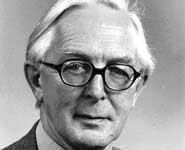Richard Hill was someone for whom the phrase “ship-shape and Bristol fashion” might well have been coined. He was born into a Bristol ship-making family whose roots went back to the Napoleonic Wars. After completing his schooling at Eton, he joined the Merchant Navy at eighteen. These were the troubled times of war and his ship was sunk under him on his very first day at sea! The fact that he was to spend only a few hours in the water before being picked up by another ship which – oddly enough – bore the name (Harptree Combe) of the village in which Richard had been born, suggested the gods had more work for him to do. After some time in the Mediterranean with the vital Malta convoys, he was transferred to the Royal Engineers to work on landing craft and saw service in India, Malaya, Borneo and Java before the days of peace returned.
On demobilization in 1946, he returned to the family firm, rising to be Chairman and Managing Director of Charles Hill of Bristol, heading a group of sixteen shipping and ship-building companies. Perhaps his most remarkable contribution to life in business was his conception and bringing to birth in the early 1970s of the Dart container-line, with what were then the three largest containerships in the world, carrying one sixth of the North Atlantic traffic. All Bristolians have reason to be grateful to him for the vital part he played in restoring the SS Great Britain to its rightful home in the city and to establishing the Maritime Heritage Centre that lies alongside it.
Bristol has always been fortunate in that however busy its citizens were in their occupations (and Richard Hill was very busy indeed), they always made time for public work. There are few parts of the public life of the city, particularly in the charitable field, which have not been touched by Richard Hill. He served for thirty years as a Justice of the Peace for Somerset and an even longer time as Trustee of the Bristol Municipal Charities. Bristol institutions from the Theatre Royal to St Monica’s called on his help. He was High Sheriff of Somerset (1964), Master of the Merchant Venturers (1975-76) and Prime Warden of the Worshipful Company of Shipwrights (1976-77). In all these many responsibilities, Dick had the constant support of Jean Mary Vernon Wills whom he married in 1948. At Harptree Court, their gracious Georgian home built in 1797, Dick and Mary were the generous hosts of a myriad of charity events: open gardens, village fetes, and the most singular of amateur musical concerts. An abiding memory is of scores of families spilling out over the Court’s beautiful lawns and gardens on a summer evening, like a rustic version of a Lowry painting.
How Richard Hill could devote so much time and energy to University affairs, when he also had such heavy public duties in so many other directions, will remain a mystery. For those of us who had the privilege of working closely with him in the University, he was ever encouraging, unflappable, good humoured and with a twinkle in his eye even in crises. He radiated an enthusiasm and boyish energy which belied his years. He continued to ski into his late sixties and was proud of his fitness, renewing his annual challenge to successive Presidents of the Union (Lady Presidents were chivalrously excluded) to race them up the main Senate House staircase. When the years caught up, he retained his interests in fishing (on the Findhorn and the Spey) and water-colour painting and took pleasure in regular contests at the chess-board or bridge-table at the Clifton Club.
When the history of the University comes to be written, Dick Hill will be shown to have made an outstanding contribution to steering it through its late 20th-century growth. He was part of a group of laymen friends – including David Tudway-Quilter, Andrew Burn, David Borland and Lloyd Robinson – who served the University with great distinction through the 1970s and 80s and saw the transition from the Merrison to the Kingman years. Just how many hundreds of University Committees he attended or chaired is uncounted, sometimes accompanied by a faithful Labrador that would flop down patiently in a corner until his master gathered up his papers. Dick brought to University matters the same qualities as he did to his shipping enterprises: deep knowledge, a willingness to take calculated risks, but always with an emphasis on the long-term view. He was proud of his Bristol roots but, ever a true Merchant Venturer, saw these as a secure harbour from which a much wider world was to be explored and enjoyed. His was a remarkably full life, finely lived, and one in which the University feels deeply privileged to have had some share – and for which it remains hugely in his debt.
